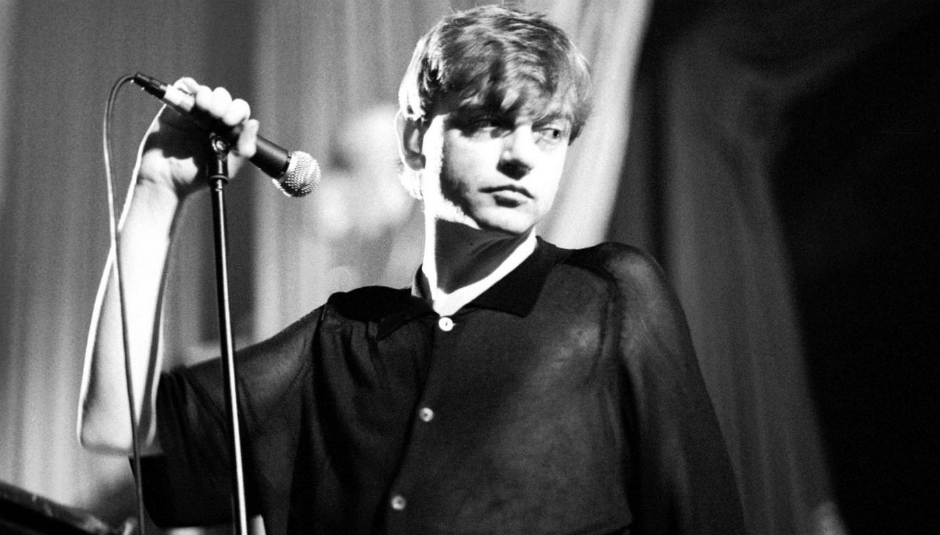"They are always different; they are always the same." - John Peel
Encapsulated in John Peel's famous quote about the band he loved above all others is everything that made The Fall, and Mark E Smith, great. A true artist, a poet, a visionary - the outpouring of love, admiration, and respect for the man and his work after the singer's sad passing say more about his legacy than words ever could. He will be sorely missed, not merely for what he leaves behind but what will be missing in the future; it's safe to say they don't make them like Mark E Smith anymore.
Below is our tribute to the moments, songs, and genius that made The Fall what they were.
’Touch Sensitive’
The biggest misconception of the Fall is the “revolving door line up”. Though there have been many, many members over the years, for most of the group’s history it has been anchored in a few key figures, with others coming and going on the sidelines. There’s arguably been two Falls, the one that’s been relatively solid for the last decade, and the one that cemented the groups reputation to begin with (admittedly the ten years in the middle were pretty chaotic.) For most of the 80s and 90s, Smith headed up pretty much the same band: Craig Scanlon, Steve Hanley, and an on-again-off-again slot for Karl Burns behind the drum stool, augmented by sundry others, but always the same engine room. The definitive Fall, for many.
The last of that line up finally peeled away in 1998 when Hanley and Burns finally walked out on the Smith after an on-stage punch up in New York. A lot of people assumed this was finally the end. They were extremely wrong. Smith and his remaining foot soldier, Julia Nagle (who stuck around despite Smith being arrested for assaulting her just hours after Hanley and Burns’ walk-out) patched together a new line up and came back with ‘Touch Sensitive’ - one of the most obviously commercial things Smith ever put his name to. Its simple riff, “hey hey hey hey!” chorus, and catchy af bassline were immediate earworms and the song promptly jumped the queue to soundtrack goal compilations on Match of the Day, car adverts, and TV idents. A bonafide floor filler that, had it been released in the indie-boom a few years later, could have been a huge hit. An extraordinary achievement that broke the shackles of the band’s legacy and showed Smith could keep the engine running without his most trusted pit crew.
Marc Burrows
The Big Midweek: Life Inside The Fall
The Fall are almost as much fun to read about as they are to listen to, some would say more so, and the many tomes on Smith and his revolving door of collaborators can act as helpful gateway to a greater appreciation of their acquired-taste rock ‘n’ roll racket. Steve Hanley was the bassist who endured Smith’s unstable antics for an outrageous length of time (1979-1998), an experience documented in tragicomic detail his autobiography The Big Midweek. Smith doesn’t exactly come out of it in a particularly good light, but then he’d have no doubt been devastated if he did.
My favourite section is when, within the space of a couple of pages, Hanley reveals the pompousness of studio owner Peter Hook’s personalised number plate (“HO 0KY”), is informed by Smith that The Fall would be leaving Phonogram on the basis that the label was wasting too much energy on promoting the greatest hits of Wet Wet Wet, and is offered a bar of Dairy Milk by Smith only to discover that the singer subsequently laid down the lyrics, “Stop eating all that chocolate / Eat salad instead”. “I wouldn’t care,” writes Hanley, “but I was only being polite eating the blasted chocolate bar! How is it even possible to take health tips from a man who, in all the years I’ve known him, I’ve never once seen him eat a vegetable, unless you count pickled onions.” For Smith’s perspective, check out his own ghostwritten and often highly digressional book Renegade which is packed with delightful surprises including, in a chapter ostensibly about football, the line “Mel C seems an alright person to me.”
J.R. Moores
’Bill Is Dead’
No matter what type of musician you hold dear, it’s easy to become a bit blasé once one continues to live up to their established reputation. When a balladeer keeps churning out love songs, at some point you start to wonder whether he really means it, or whether he’s just catering to a proven golden formula. Mark E. Smith, with all his daredevil antics and risible lyrical non-sequiturs, couldn’t just be contrarian for the sake of just that. His mysticism and believability only became more palpable when he allowed the listener to poke through the armor. ‘Bill Is Dead’, with its wistful vocal delivery and gorgeous organ motif, is one of The Fall’s most earnest cuts, offering up a more altruistic glimpse into the rabid immersion Mark E. Smith tends to invite. ‘Bill Is Dead’ is the kind of reticent, elusive sonic deviation that separates great bands from just the really good ones. “I am anew, I am aglow.”
Jasper Willems
’Bury, Pts. 1 + 3’
I hope, before he died, Mark E Smith had the chance to see those classical Smiths gigs fall apart within about five minutes of them being announced because he’d have pissed his sides laughing. He was a lot of things but he wasn’t, for a minute, a part of any particular scene, sect or movement, and he certainly never looked backwards. As recently as 2007, he was collaborating with Mouse on Mars as Von Südenfed, and their Tromatic Reflexxions record was a fucking gem that you should be abandoning this article in search of right this minute.
Every obituary will characterise Smith as a misfit and an outcast but he was never more of either than he was in his own hometown. Manchester is the most self-aggrandising city on the face of the planet and it does a particularly good line in trading off of former glories. Why celebrate this weird bloke who’s making a record a year and going out of his way to work with artists from outside of his wheelhouse - he made a point of writing with members of Napalm Death and The Wildhearts as Mutation a few years back - when you can have an orchestra play ‘Step On’ in front of 5000 office workers and get Bez to come out and shake his maracas?
There wasn’t a place for Smith within the superficiality of present-day Manchester. Not that that’s where he was from; he was Salfordian, and as Tony Wilson once observed, there’s a symbiotic relationship between the two cities, a bit like Minneapolis and Saint Paul in Minnesota. Tied together, but with their own identity. He didn’t do Gallagher-esque mass-market soap-opera intrigue and he’d have doubtless have thought that the courtroom disintegration of New Order was a good laugh, but I would dare you to find any member of Manchester’s thrilling new guard of the past few years - PINS, Pearl City, Virginia Wing, MONEY, Lost Under Heaven - and have them tell you that they never took their cues from The Fall.
They all did, and that’s Smith’s legacy. His creative bravery was never properly appreciated in his lifetime and you can only hope that it might be now he’s gone. I’ll have to watch as I see his old stomping ground of Prestwich subsumed by gentrification; comically, the main road through it into Manchester is presently dotted with hardcore seventies boozers on one side and five-notes-a-pint yuppie traps on the other. I’ll be hearing him bark “I’M FROM BURY, A FRENCH PRINCE” forever, though. Ta-ra Mark E Smith - a hard man with a hard liver, and a face like an unmade bed.
Joe Goggins
’Spectre Vs. Rector’
BUM. BUM. BUM. BUDA-BUDA-BUDA BUM.
I just read Taylor Parkes’ admirably in-depth Quietus piece on Mark E Smith’s narrative songs today. If you want that sort of cleverly irrelevant sort of microcosm study, go read that. My love for ‘Spectre Vs. Rector’ hinges solely on the sonic assault, the sense of dire and cataclysmic phenomena and an ephemeral showdown played out in such lurches and jerks and squawks that no one even needs to read the script. You could try and impose logic on the beast, wrangle out who is Hero and the Inspector and Spector and the Rector - but at the end of the day, all that really matters is that jagged raging rhythm, and how phrases stick and spew when you yell them over the din. Go on, you try and mimic MES and say “BUT THE POSSESSION WAS INEFFECTUAL”. Rolls off the tongue like a store-bought caramel chew, right?
Now, to be clear, I’ve also read Brix Smith Start’s autobiography, so I’m holding back somewhat on my praise. Nevertheless, while plenty other gleefully perverse noises from post-punk’s heyday have transcended history to invert my virgin mind forever, ‘Spectre Vs. Rector’ has possessed me solely by force, not wit or groove. And I do mean possess - whenever I pick up my bass to noodle around, often the second or third riff that comes to my fingers is
BUM. BUM. BUM. BUDA-BUDA-BUDA BUM.
Lee Adcock
'Sparta FC #2'
My favourite Mark E. Smith moment wasn’t a song, a performance, or even an interview, it was when he read the football scores in 2005. This seven-minute slice of genius, on the face of it, is just a middle-aged man reading words and saying numbers, but it means so much more. You can hear in his inflection how he feels about teams. Bournemouth gets a slight sneer, and Southampton get a Town added to their name and the less mentioned about his beloved Manchester City the better. But it isn’t until the brief chat at the end when Ray Stubbs, who is practically beaming throughout, tries to interview MES and ends up on the receiving end of his typically biting responses.
“What is the background to Sparta FC?” Ray asks “Dunno” MES responds, to cackles from the collected pundits before adding “It's mythological, it's Greek”. Ray tries to chat football but MES cuts him off and asks “Why have you got a number one haircut? It's like, what the people, the murderers, in Strangeways get. It's like you’ve escaped from Strangeways… I’m serious! It's a number one!” “It just goes this way” Ray responds, trying to bring things back on track. “Who told you that? The makeup department?” MES fires back.
This is classic MES. Even when he is doing something as innocuous as reading the football scores on a Saturday afternoon he can’t hold back by putting some ‘friendly’ and slightly sardonic digs in.
After a brief chat about the similarities between being in a band and a football team, and what MES is up to next Ray says “I hope you don’t mind us using Sparta FC to top and tail our program” trying to wind things up on good terms. “Not at all, I don’t get a penny anyway so it doesn’t matter”
But it did matter, as did you!
MES 1 - The Establishment 0.
Nick Roseblade
’Paintwork’
‘Paintwork’ from 1985’s This Nation’s Saving Grace captures what made The Fall a band that you cannot turn your eyes away from. A ceaseless, repeating, motorik rhythm with far too many cymbal crashes and a lazy, ambling guitar line is the core of the track, whilst Mark E. mumbles over it at his pleasure and whim, often incomprehensibly. For the uninitiated, there is nothing in that description – perhaps even in the piece itself – that holds any obvious appeal.
Smith understood that great music does not need to have anything to do with verses and choruses, traditional chord progressions or builds and payoffs. If you can craft yourself into a groove, you can stay there forever. Hell, even disco understood that. Lyrically, as ever, you make your own sense out of the rubble of stream of consciousness that MES decides to drizzle over the track, but, deliciously, it appears to have something to do with a Paula Yates autobiography.
The story goes that the track had nearly been completed when Smith took the recording home on a cassette and accidentally recorded a snippet of an Open University documentary on red giants over part of the song. Deciding that it made the final song undebatably better, the snippet remained. He was, of course, right.
Max Pilley
Live at Summer Sundae
I thought The Fall were the most over-rated and tuneless band until I saw them live at Summer Sundae. I've never seen such a ramshackle racket unfurl and reveal itself to be the most controlled but aggressive, repeated punch to both ears. "Cantankerous" was the only word I wrote in my notebook, after watching that drill master glare at his incredibly taut band before that trademark malarkey with their gear began... It felt like suddenly understanding a joke in a foreign language but realising the joke was on me. Appreciating that they were the unfettered source of much of the music I loved was a moment of clarity, like seeing a magic eye for a brief moment in time. Going home to listen to the records it never quite came back into focus... Like an oasis of filth. Like a rare bird, coughing up oil. Like a hall of smashed mirrors. (I'm glad I got to glimpse it).
Sean Adams
Read the 8/10 DiS review of The Fall's last album, New Facts Emerge, here.






















